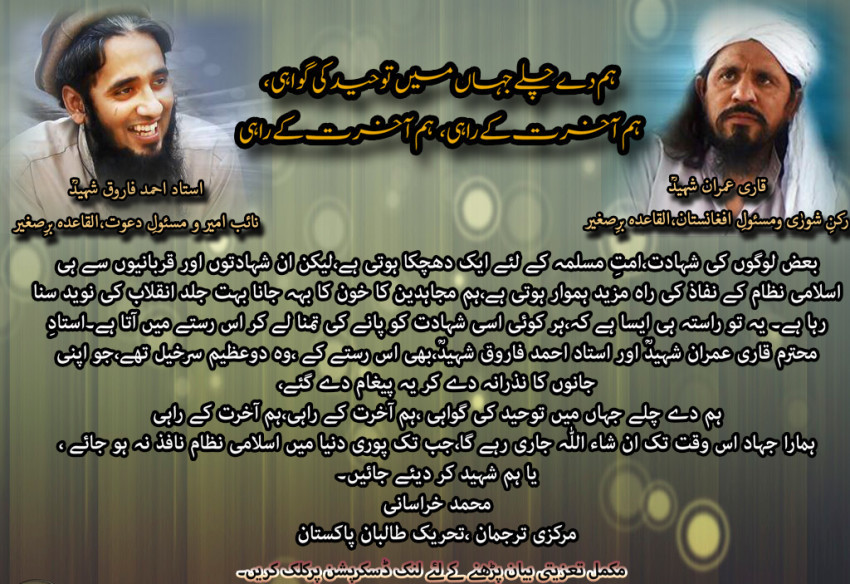The Movement of the Taliban in Pakistan eulogized two senior al Qaeda leaders who were killed in US drone strikes at the beginning of this year. The statement highlights the close working relationship between the two jihadist groups.
Muhammad Khurasani, the “central spokesman” for the Movement of the Taliban in Pakistan, praised Ustad Ahmad Farooq and Qari ‘Imran in an Urdu-language email that was sent to The Long War Journal. Umar Media, the official propaganda outlet of the Movement of the Taliban in Pakistan, also posted the statement on its website.
Farooq, who was Al Qaeda in the Indian Subcontinent’s deputy emir, was killed in a US drone strike on Jan. 15. ‘Imran, a member of AQIS’s shura or central council and the group’s commander for Afghanistan, was killed on Jan. 5. [See LWJ report, US killed AQIS deputy emir, shura member in January drone strikes.]
The Taliban spokesman described ‘Imran as being “among the greatest militant teachers,” and noted that he and “thousands” of other jihadists trained under him.
“Thousands of young men received militant training from him before going and dealing heavy strikes against the centers of the infidels,” Khurasani said. “I also gained my militant training from him… He would always ask about the companions who were in militant training, asking how they were doing.”
Al Qaeda, the Movement of the Taliban in Pakistan, and a host of jihadist groups are known to operate training camps in Pakistan’s tribal areas and throughout the country. The groups are known to train with each other.
Khurasani admitted that al Qaeda oversaw Umar Media’s activities and provided guidance. He noted that he frequently worked with Farooq, who prior to serving as the deputy emir of AQIS led al Qaeda in Pakistan’s media efforts.
“We would frequently meet for the purpose of media related tasks,” Khurasani said. “During our meetings, if he would see any mistakes in any of our Umar Media productions or in any of my statements that I would release as the spokesman, he would point them out in a very kind and loving way, allowing me to benefit from his valuable suggestions.”
Al Qaeda and the Taliban remain allies
Khurasani’s eulogy of Farooq and ‘Imran further highlights the intimate ties between the two groups.
Al Qaeda and the Movement of the Taliban in Pakistan have had a close working relationship since the latter was formed in December 2007. The Movement of the Taliban in Pakistan has provided shelter for al Qaeda in Pakistan’s tribal areas, while al Qaeda has provided military expertise and access to global donors. Al Qaeda often exercises control and veto power over major policy decisions related to the Movement of the Taliban in Pakistan.
Evidence of this relationship is seen in the small number of Osama bin Laden’s documents that have been released to the public. Bin Laden and his general manager, Atiyah Abd al Rahman, frequently discussed the Movement of the Taliban in Pakistan. While the al Qaeda leaders often express frustration over the Taliban’s attacks that kill civilians and other issues, it is clear that al Qaeda exercises a degree of control over the group.
For instance, when former Movement of the Taliban in Pakistan emir Hakeemullah Mehsud submitted a draft on the group’s role in the Pakistani jihad to bin Laden, al Qaeda exercised its veto authority and put Hakeemullah in his place. [See LWJ report, Bin Laden docs: Al Qaeda asserts authority in letter to Pakistani Taliban leader.]
Atiyah and Abu Yahya al Libi, his deputy, said that Hakeemullah’s proposal was “unacceptable and we don’t approve it because it contains political and Sharia mistakes.”
Additionally, the two al Qaeda leaders admonished Hakeemullah for describing al Qaeda fighters as “guests” and attempting to poach jihadists from an al Qaeda “company” commander known as Badr Mansoor.
“We make it clear to you that the brother Badr (Mansoor) is one of the soldiers of the Qaedat al-Jihad Organization who swore allegiance to Sheikh Osama (bin Laden), is with us, under our command, the Emir of a company of ours,” they wrote. “Badr Mansoor and other members of our group are not to be approached to join another organization or to deploy to other locations. Good manners and group work mandate that such a request be presented to his Tanzim (al Qaeda) Emir and superiors.”
Al Qaeda’s rebuke to Hakeemullah did not lead to a split between the two groups. In fact, it appears that Hakeemullah followed al Qaeda’s commands. Badr Mansoor remained a potent al Qaeda company commander up until he was killed in a US drone strike in North Waziristan in February 2012.









1 Comment
“…..in an Urdu-language email that was sent to The Long War Journal….” Congrats, Bill, the Al-Qaeda boys are reading your stuff…